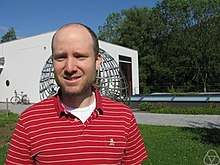Ivan Corwin
Ivan Zachary Corwin (born May 24, 1984) is a professor of mathematics at Columbia University.[1]
Ivan Corwin | |
|---|---|
 | |
| Born | May 24, 1984 |
| Nationality | American |
| Alma mater | New York University, Harvard University |
| Awards | David and Lucile Packard Foundation Fellowship for Science and Engineering (2014) Rollo Davidson Prize (2014) Poincare Chair (2014) Young Scientist Prize of the International Union of Pure and Applied Physics (2012) Clay Research Fellow (2012) |
| Scientific career | |
| Fields | Mathematician |
| Institutions | Columbia University |
| Doctoral advisor | Gerard Ben Arous |
Research
His research concerns probability, mathematical physics, quantum integrable systems, stochastic PDEs, and random matrix theory. He is particularly known for work related to the Kardar–Parisi–Zhang equation.[2] [3]
Education and career
Corwin was born in Poughkeepsie, New York. He graduated from Harvard University in 2006 receiving an A.B. in Mathematics, and subsequently received his Ph.D. from the Courant Institute at New York University under direction of Gerard Ben Arous. He held the first Schramm Memorial Postdoctoral Fellowship at Microsoft Research, New England and MIT from 2012-2014, was a Clay Research Fellow from 2012-2016, and held the first Poincare Chair in 2014 at the Institute Henri Poincare. Corwin has taught at Columbia University since 2013.
Awards and honors
In 2014, Corwin was awarded a David and Lucile Packard Foundation Fellowship for Science and Engineering as well as the Rollo Davidson Prize. Also in that year, he was invited to present his work at the International Congress of Mathematicians. In 2012 he received that Young Scientist Prize of the International Union of Pure and Applied Physics.
References
- "University home page". Columbia University. Retrieved 25 August 2017.
- "Packard Foundation". Retrieved 25 August 2017.
- "Ivan Corwin". Clay Mathematics Institute. Retrieved 25 August 2017.